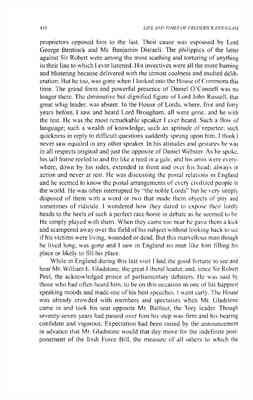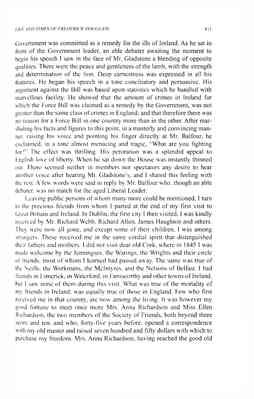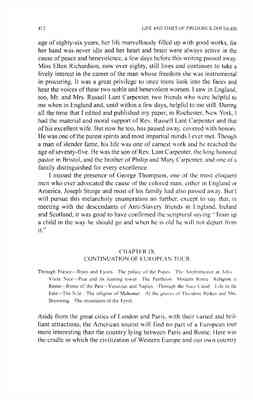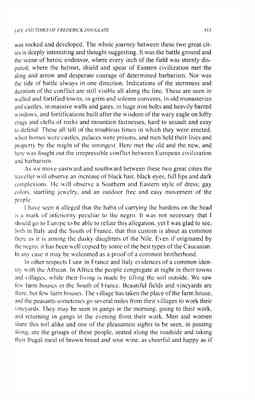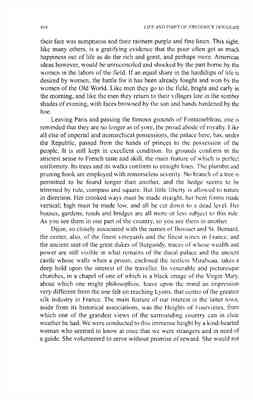Pages
36
410 LIFE AND TIMES OF FREDERICK DOUGLASS
proprietors opposed him to the last. Their cause was espoused by Lord George Bentinck and Mr. Benjamin Disraeli. The philippics of the latter against Sir Robert were among the most scathing and torturing of anything in their line to which I ever listened. His invectives were all the more burning and blistering because delivered with the utmost coolness and studied deliberation. But he too, was gone when I looked into the House of Commons this time. The grand form and powerful presence of Daniel O'Connell was no longer there. The diminutive but dignified figure of Lord John Russell, that great whig leader, was absent. In the House of Lords, where, five and forty years before, I saw and heard Lord Brougham, all were gone, and he with the rest. He was the most remarkable speaker I ever heard. Such a flow of language; such a wealth of knowledge; such an aptitude of repartee; such quickness in reply to difficult questions suddenly sprung upon him. I think I never saw equaled in any other speaker. In his attitudes and gestures he was in all respects original and just the opposite of Daniel Webster. As he spoke, his tall frame reeled to and fro like a reed in a gale, and his arms were everywhere, down by his sides, extended in front and over his head; always in action and never at rest. He was discussing the postal relations in England and he seemed to know the postal arrangements of every civilized people in the world. He was often interrupted by "the noble Lords" but he very simply disposed of them with a word or two that made them objects of pity and sometimes of ridicule. I wondered how they dared to expose their lordly heads to the heels of such a perfect race horse in debate as he seemed to be. He simply played with them. When they came too near he gave them a kick and scampered away over the field of his subject without looking back to see if his victims were living, wounded or dead. But this marvelous man though he lived long, was gone and I saw in England no man like him filling his place or likely to fill his place.
While in England during this last visit I had the good fortune to see and hear Mr. William E. Gladstone, the great Liberal leader, and, since Sir Robert Peel, the acknowledged prince of parliamentary debaters. He was said by those who had often heard him, to be on this occasion in one of his happiest speaking moods and made one of his best speeches. I went early. The House was already crowded with members and spectators when Mr. Gladstone came in and took his seat opposite Mr. Balfour, the Tory leader. Though seventy-seven years had passed over him his step was firm and his bearing confident and vigorous. Expectation had been raised by the announcement in advance that Mr. Gladstone would that day move for the indefinite postponement of the Irish Force Bill, the measure of all others to which the
37
LIFE AND TIMES OF FREDERICK DOUGLASS 411
Government was committed as a remedy for the ills of Ireland. As he sat in front of the Government leader, an able debater awaiting the moment to begin his speech I saw in the face of Mr. Gladstone a blending of opposite qualities. There were the peace and gentleness of the lamb, with the strength and determination of the lion. Deep earnestness was expressed in all his features. He began his speech in a tone conciliatory and persuasive. His argument against the Bill was based upon statistics which he handled with marvellous facility. He showed that the amount of crimes in Ireland for which the Force Bill was claimed as a remedy by the Government, was not greater than the same class of crimes in England; and that therefore there was no reason for a Force Bill in one country more than in the other. After marshaling his facts and figures to this point, in a masterly and convincing manner, raising his voice and pointing his finger directly at Mr. Balfour, he exclaimed, in a tone almost menacing and tragic, "What are you fighting for?" The effect was thrilling. His peroration was a splendid appeal to English love of liberty. When he sat down the House was instantly thinned out. There seemed neither in members nor spectators any desire to hear another voice after hearing Mr. Gladstone's, and I shared this feeling with the rest. A few words were said in reply by Mr. Balfour who, though an able debater, was no match for the aged Liberal Leader.
Leaving public persons of whom many more could be mentioned, I turn to the precious friends from whom I parted at the end of my first visit to Great Britain and Ireland. In Dublin, the first city I then visited, I was kindly received by Mr. Richard Webb, Richard Allen, James Haughton and others. They were now all gone, and except some of their children, I was among strangers. These received me in the same cordial spirit that distinguished their fathers and mothers. I did not visit dear old Cork, where in 1845 I was made welcome by the Jenningses, the Warings, the Wrights and their circle of friends, most of whom l learned had passed away. The same was true of the Neills, the Workmans, the McIntyres, and the Nelsons of Belfast. I had friends in Limerick, in Waterford, in Enniscorthy and other towns of Ireland, hut l saw none of them during this visit. What was true of the mortality of my friends in Ireland, was equally true of those in England. Few who first received me in that country, are now among the living. It was however my good fortune to meet once more Mrs. Anna Richardson and Miss Ellen Richardson, the two members of the Society of Friends, both beyond three score and ten, and who, forty-five years before, opened a correspondence with my old master and raised seven hundred and fifty dollars with which to purchase my freedom. Mrs. Anna Richardson, having reached the good old
38
LIFE AND TIMES OF FREDERICK DOUGLASS 412
age of eighty-six years, her life marvellously filled up with good works, for her hand was never idle and her heart and brain were always active in the cause of peace and benevolence, a few days before this writing passed away. Miss Ellen Richardson, now over eighty, still lives and continues to take a lively interest in the career of the man whose freedom she was instrumental in procuring. It was a great privilege to once more look into the faces and hear the voices of these two noble and benevolent women. I saw in England, too, Mr. and Mrs. Russell Lant Carpenter, two friends who were helpful to me when in England and, until within a few days, helpful to me still. During all the time that I edited and published my paper, in Rochester, New York, I had the material and moral support of Rev. Russell Lant Carpenter and that of his excellent wife. But now he too, has passed away, covered with honors. He was one of the purest spirits and most impartial minds I ever met. Though a man of slender fame, his life was one of earnest work and he reached the age of seventy-five. He was the son of Rev. Lant Carpenter, the long honored pastor in Bristol, and the brother of Philip and Mary Carpenter, and one of a family distinguished for every excellence.
I missed the presence of George Thompson, one of the most eloquent men who ever advocated the cause of the colored man, either in England or America. Joseph Sturge and most of his family had also passed away. But I will pursue this melancholy enumeration no further, except to say that, in meeting with the descendants of Anti-Slavery friends in England, Ireland and Scotland, it was good to have confirmed the scriptural saying "Train up a child in the way he should go and when he is old he will not depart from it."
CHAPTER IX. CONTINUATION OF EUROPEAN TOUR.
Through France– Dijon and Lyons– The palace of the Popes– The Ampitheater at Arles Visits Nice– Pisa and its leaning tower– The Pantheon– Modern Rome– Religion at Rome– Rome of the past– Vesuvius and Naples– Through the Suez Canal– Life in the East– The Nile– The religion of Mahomet– At the graves of Theodore Parker and Mrs. Browning– The mountains of the Tyrol.
Aside from the great cities of London and Paris, with their varied and brilliant attractions, the American tourist will find no part of a European tour more interesting than the country lying between Paris and Rome. Here was the cradle in which the civilization of Western Europe and our own country
39
LIFE AND TIMES OF FREDERICK DOUGLASS 413
was rocked and developed. The whole journey between these two great cities is deeply interesting and thought suggesting. It was the battle ground and the scene of heroic endeavor, where every inch of the field was sternly disputed; where the helmet, shield and spear of Eastern civilization met the sling and arrow and desperate courage of determined barbarism. Nor was the tide of battle always in one direction. Indications of the sternness and duration of the conflict are still visible all along the line. These are seen in walled and fortified towns, in grim and solemn convents, in old monasteries and castles, in massive walls and gates, in huge iron bolts and heavily barred windows, and fortifications built after the wisdom of the wary eagle on lofty crags and clefts of rocks and mountain fastnesses, hard to assault and easy to detend. These all tell of the troublous times in which they were erected, when homes were castles, palaces were prisons, and men held their lives and property by the might of the strongest. Here met the old and the new, and here was fought out the irrepressible conflict between European civilization and barbarism.
As we move eastward and southward between these two great cities the traveller will observe an increase of black hair, black eyes, full lips and dark complexions. He will observe a Southern and Eastern style of dress; gay colors, startling jewelry, and an outdoor free and easy movement of the people.
I have seen it alleged that the habit of carrying the burdens on the head is a mark of inferiority peculiar to the negro. It was not necessary that I should go to Europe to be able to refute this allegation, yet I was glad to see, both in Italy and the South of France, that this custom is about as common there as it is among the dusky daughters of the Nile. Even if originated by the negro, it has been well copied by some of the best types of the Caucasian. In any case it may be welcomed as a proof of a common brotherhood.
In other respects I saw in France and Italy evidences of a common identity with the African. In Africa the people congregate at night in their towns and villages, while their living is made by tilling the soil outside. We saw few farm houses in the South of France. Beautiful fields and vineyards are there, but few farm houses. The village has taken the place of the farm house, and the peasants sometimes go several miles from their villages to work their vineyards. They may be seen in gangs in the morning, going to their work, and returning in gangs in the evening from their work. Men and women share this toil alike and one of the pleasantest sights to be seen, in passing along, are the groups of these people, seated along the roadside and taking their frugal meal of brown bread and sour wine, as cheerful and happy as if
40
414 LIFE AND TIMES OF FREDERICK DOUGLASS
their fare was sumptuous and their raiment purple and fine linen. This sight, like many others, is a gratifying evidence that the poor often get as much happiness out of life as do the rich and great, and perhaps more. American ideas however, would be unreconciled and shocked by the part borne by the women in the labors of the field. If an equal share in the hardships of life is desired by women, the battle for it has been already fought and won by the women of the Old World. Like men they go to the field, bright and early in the morning, and like the men they return to their villages late in the somber shades of evening, with faces browned by the sun and hands hardened by the hoe.
Leaving Paris and passing the famous grounds of Fontainebleau, one is reminded that they are no longer as of yore, the proud abode of royalty. Like all else of imperial and monarchical possessions, the palace here, has, under the Republic, passed from the hands of princes to the possession of the people. It is still kept in excellent condition. Its grounds conform in the strictest sense to French taste and skill, the main feature of which is perfect uniformity. Its trees and its walks conform to straight lines. The plumbit and pruning hook are employed with remorseless severity. No branch of a tree is permitted to be found longer than another, and the hedge seems to be trimmed by rule, compass and square. But little liberty is allowed to nature in direction. Her crooked ways must be made straight, her bent forms made vertical; high must be made low, and all be cut down to a dead level. Her houses, gardens, roads and bridges are all more or less subject to this rule. As you see them in one part of the country, so you see them in another.
Dijon, so closely associated with the names of Bossuet and St. Bernard; the center, also, of the finest vineyards and the finest wines in France, and the ancient seat of the great dukes of Burgundy, traces of whose wealth and power are still visible in what remains of the ducal palace and the ancient castle whose walls when a prison, enclosed the restless Mirabeau, takes a deep hold upon the interest of the traveller. Its venerable and picturesque churches, in a chapel of one of which is a black image of the Virgin Mary, about which one might philosophize, leave upon the mind an impression very different from the one felt on reaching Lyons, that center of the greatest silk industry in France. The main feature of our interest in the latter town, aside from its historical associations, was the Heights of Fourvicres, from which one of the grandest views of the surrounding country can in clear weather be had. We were conducted to this immense height by a kind-hearted woman who seemed to know at once that we were strangers and in need of a guide. She volunteered to serve without promise of reward. She would not
